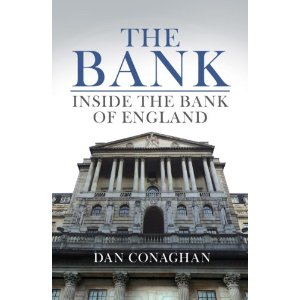The Bank: Inside the Bank of England by Dan Conaghan. Thoughts and a competition.
I’ve just finished reading Dan Conaghan’s newly published book The Bank: Inside the Bank of England. It’s very good – and essential reading for all bond geeks. We met with Dan a couple of weeks ago (he’s coming in for a lunch with a few clients next week) to talk through some of the themes in the book. First of all it’s a big surprise just how little has been written about the Bank of England over the past couple of decades, especially given how much has happened over that period – independence in 1997, the credit crisis and the bank bailouts, and Quantitative Easing in particular. Perhaps the best insight so far came in Alistair Darling’s autobiography, and like that book, the striking thing here is the criticism that Governor Mervyn King comes in for. King comes under attack for both his refusal to take advice and his reliance on a handful of people within his beloved Economics Division, but more seriously for his slow and perverse responses to the UK banking crisis and in particular the Northern Rock bank run.
Elsewhere there are a few other things that caught my eye. I hadn’t realised that in a late 2009 speech, Chief Economist Charlie Bean talked about one feature of Quantitative Easing being that it lowered gilt yields “so reducing the cost of financing a given deficit”. I’ve not seen that benefit of QE – i.e. reducing the national debt burden – ever mentioned again (I saw a former German ECB council member talk today and he described QE type regimes as “fiscal dominance” of politicians over central banks).
And there’s Paul Fisher of the MPC being questioned by a Treasury Committee about whether the Bank of England could intervene in the foreign exchange markets to change the value of sterling to hit the inflation target. “The exchange rate policy is part of monetary policy…the MPC can intervene in exchange markets if it thinks it is appropriate to help meet the inflation target”. Again though, not something I’ve ever seen discussed since, but worth bearing in mind especially as the pound remains so strong (we could sell loads of freshly printed expensive fivers and set up a SWF! We could put the proceeds together with the imaginary £28 billion that the government is getting from taking over the Post Office pension fund?).
Finally there’s a fair bit of debate about the next Governor of the Bank of England (Mervyn King’s term ends next year so there could be an announcement after the summer). Following the failures of the Tripartite arrangements during the credit crisis (Michael Fallon MP to the Governor regarding the actions of the Tripartite during the credit crisis: “Who was in charge?”. Mervyn King: “What do you mean by “in charge”? Would you like to define that?”) there’s a suggestion that an outsider like Lord Sassoon, commercial secretary to the Treasury might be the first external appointment for three decades. I’ve no view on Lord Sassoon, but I would be disappointed if Paul Tucker, current Deputy Governor, didn’t get the top job. I think markets would too – he has the right mixture of intellect, pragmatism and experience to cope with the future issues that the ongoing credit crisis will throw at the UK.
So a competition. We’re giving away 10 copies of Dan Conaghan’s book. The question is this:
It was first published in 1993 and cost £4. It now costs £3, a fall of 25%. Which influential publication is this (clue: you can find the answer in the book…)?
This competition is now closed.
The value of investments will fluctuate, which will cause prices to fall as well as rise and you may not get back the original amount you invested. Past performance is not a guide to future performance.


18 years of comment
Discover historical blogs from our extensive archive with our Blast from the past feature. View the most popular blogs posted this month - 5, 10 or 15 years ago!


Bond Vigilantes
Get Bond Vigilantes updates straight to your inbox






